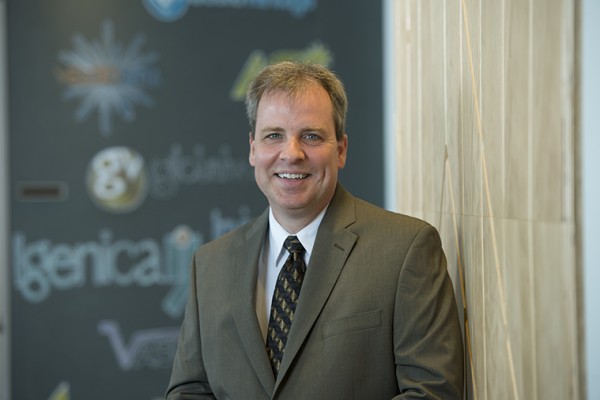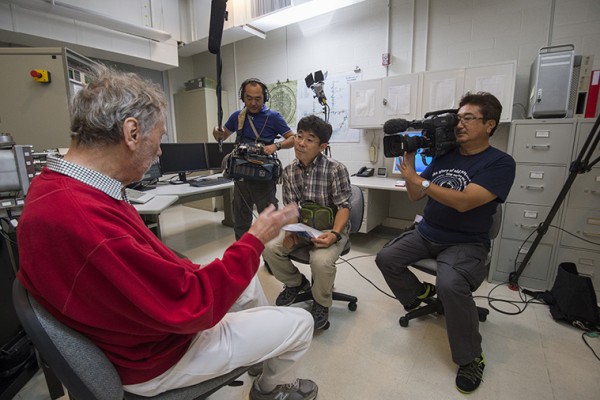‘The process by which drugs are discovered and developed will be fundamentally different in the future’
Over the past several decades, Michael Kinch of Washington University in St. Louis says, the pharmaceutical industry has managed to dismantle itself. In a provocative series of articles and interviews, Kinch, the director of the Center for Research Innovation in Businessat the university, has been describing the history of this dismantling and its implications for the future of medicine.
Japanese film crew talks stardust with physicists
A film crew from NHK, the Japan Broadcasting Corp., visited the Danforth Campus of Washington University in St. Louis last week to film for a series called “Cosmic Front HOTLINK” about the wonders of the universe. Here, they interview Ernst Zinner, PhD, research professor of physics in Arts & Sciences. He pioneered techniques to study tiny bits of matter from stars that died before the solar system was born.
Forgotten history: Gloria Rolando screens film Oct. 13
In “Reembarque/Reshipment,” Cuban filmmaker Gloria Rolando examines the lasting influence — on Cuban language, music and culture — of Haitian laborers, brough to work the sugarcane fields and coffee plantations. At 6 p.m. Monday, Oct. 13, Rolando will host a free screening in the Danforth University Center.
Jazz at Homes celebrates Gaslight Square Sept. 25
In the 1950s and ’60s, Gaslight Square hosted a who’s who of American entertainers — everyone from Lenny Bruce to Miles Davis to Barbra Streisand. On Thursday, Sept. 25, Washington University will pay homage to Gaslight Square with a special Jazz at Holmes concert.
‘Divided City’ project to examine segregation from variety of perspectives
Legal segregation may be over, but segregation is hardly a thing of the past. This fall, the Center for the Humanities in Arts & Sciences and the Sam Fox School of Design & Visual Arts will launch “The Divided City: An Urban Humanities Initiative.” The $1.6 million project — funded in part by a four-year, $650,000 grant from the Mellon Foundation — will examine segregation from a variety of perspectives.
Braxs receives Hispanic heritage award from NFL
The St. Louis Rams have selected Virginia Braxs, senior lecturer in Romance languages and literatures in Arts & Sciences, as a recipient of the NFL Hispanic Heritage Leadership Award.
Next up in Assembly Series: Focus on race, culture and identity
The Assembly Series will feature next week speakers who explore issues of race, culture and identity — in two distinct ways. At 5 p.m. Monday, Sept. 29, race and gender scholar Roderick Ferguson, PhD, will deliver the annual James E. McLeod Lecture on Higher Education. At noon Tuesday, Sept. 30, legal and literary scholar Patricia J. Williams, JD, will speak for the Interdisciplinary Project in the Humanities’ annual lecture series. Both are free and open to the public.
Wash U Expert: Adrian Peterson and child abuse
On Sept. 11 — just one week into the 2014 NFL season — running back Adrian Peterson was indicted on charges of beating his four-year-old son with a tree branch. In the uproar that followed, Peterson was suspended from professional football and pilloried by pundits left and right. Washington University in St. Louis Associate Professor Jeffrey Q. McCune Jr., PhD, who writes about masculinity, performance studies and popular culture, shares his thoughts.
DUC Chamber Music Series begins fall concerts Sept. 23
Cellist Kenneth Kulosa and pianist Patti Wolf launch the fall Danforth University Center Chamber Music Series on the campus of Washington University in St. Lous at 7:30 p.m. Tuesday, Sept. 23, with the music of Sergei Rachmaninov and Igor Stravinsky.
Spouse’s personality influences career success, study finds
As much as we might try to leave personal lives at home, the personality traits of a spouse have a way of following us into the workplace, exerting a powerful influence on promotions, salaries, job satisfaction and other measures of professional success, new research from Washington University in St. Louis suggests.
View More Stories


